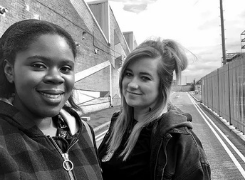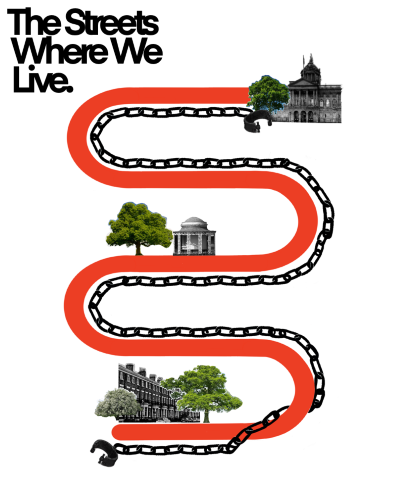YEP Spotlight: Falling Doors Theatre
Welcome to YEP Spotlight: a place to catch up with our Young Everyman Playhouse alumni and share what they are up to.
This week we spoke to Falling Doors Theatre's artistic director and creative producer Nancy Msiska and Sarah Van Parys - two graduates from our YEP Programme.

Sarah founded Falling Doors Theatre shortly after directing The Morning After by Dave Cox, as part of The Annexe Writers playwrights group. During the play, a door collapsed at a pivitol moment of the action. Luckily, no one was injured and the play carried on successfully... and Falling Doors Theatre was born. Nancy, joined the team shortly after.
Nancy and Sarah are currently working with Everyman & Playhouse and historian Laurence Westgaph on The Streets Where We Live - a performance art piece that take audiences on a bespoke walking tour, where audiences will discover new truths about the streets we live on.
Hiya both! Let's start at the beginning... how did you meet?
Nancy: Short answer, Sarah slid in my DMs.
Long answer, Sarah had founded Falling Doors Theatre and was self-producing/directing everything. In 2018 she was in pre-production for The Nether by Jennifer Haley and introduced herself to me online looking for a producer to work on the play with her. I had just finished my final year in YEP Producers and jumped at the chance to explore developing a piece of challenging theatre with a talented creative team and build on the skills I’d developed.
We worked really well together and after the production’s run at The Hope Street Theatre we remained in contact and soon after I became a permanent partner in running Falling Doors as the Creative Producer.
Can you describe Falling Doors in three words?
Intentional: everything we do has a specific intent/goal to achieve
Inquisitive: connects to our manifesto of re-telling forgotten or unheard stories and challenging audiences to think/reflect on how they see things
Honest: we don’t believe in sugar coating stories or history, we want to tell things how they were or with a new spin/re-focus the lens to highlight a particular person in the story or their viewpoint
What are your main goals as a company?
We have three core principles that encompass what we do as a company:
- Re-tell forgotten or unheard stories (e.g. historical figures, invisible heroes) or change the lens and refocus the protagonist of a well-known event or figure
- Present a warped or fractured view on a reality or a future reality – holding up an inverted mirror against it.
- Share plays with a message that challenges and incites thoughts and debates in the audience
Tell us about a piece of theatre you’ve seen that’s particularly inspired you?
Nancy: There are a range of productions I could mention but surprisingly, I’d like to namedrop the musical Six. Not for its outstanding vocal performances, witty and comical lyrics/dialogue, stunning visual production or bold inclusion of featuring exclusively, powerhouse people who identify as female on stage though.
Rather, for how it’s completely transformed and retold the history of Henry the Eighth and his infamous legacy. Although I’d like to be clear all the former points very much still stand for me as well!
They’ve shone a light on his wives who can be misrepresented and exposed a wide range of audiences to hearing 'Her-story'. It changed how I perceived the version of history I’d been given through other media, and it’s astounding how that was achieved through a glamourous and fun piece of musical theatre.
There is power in how theatre can not only entertain but present information in a new way to new audiences and promote a new way of thinking.
Sarah: I recently saw the brilliant Build a Rocket by one of the fab YEP Directors, Jessica Meade, at the Everyman. It was the first play I’d seen in a long time due to lockdown and it blew my mind. The cast were utterly amazing, the story was told beautifully and with such simplicity in terms of staging and set. A total contrast to my first year directing shows, where we filled the studio with around 200 boxes built into a set.
It was a brilliant play and they smashed it, it’s given me the kick to get creating again after a very long year and a bit of feeling a bit uninspired and lost!
What’s your experience of our Young Everyman Playhouse programme?
Nancy: I was part of the young producers programme from 2016-2018. It offered invaluable experience in the practical nature of producing a show with the expert guidance of the YEP team. It also gave us insights into the industry with workshops from various visiting producers. It was also great to network with other young creatives across all branches as we navigated making work in the city and beyond.
Sarah: I joined YEP (best thing I ever did) in 2013 a year after graduating from uni. We were the first directing course members and it was meant to only be a one year course at first. I honestly would not be doing theatre now if it wasn’t for YEP leads Matt and Tomo. I say it all the time, but the support they’ve offered me both during the course and for the seven years after finishing is invaluable. I can hand on heart say I can pick up the phone and call either of them anytime for help with a show or if I’m facing a huge problem in tech etc and they’ll do whatever they can to help.
Creating work in the Everyman Studio really helped me refine what I wanted to create and how I wanted my work to come across as a Director.

What do you want audiences to take away from The Streets Where We Live?
Nancy: I would like audiences to have a more profound realisation on what this aspect of history is about.
We all have a general understanding of the subject matter based on the limited information we learnt in school and have seen through documentaries and film, but there are more nuances to the history of slavery in Liverpool and beyond.
I'd like audiences to think about how this history has a lasting impact beyond exhibitions in a museum. It’s shaped our society the way many different events and people throughout history have.
Sarah: I think there’s so much that we don’t know about the places we live. We walk down these streets every single day and don’t know the history underneath our feet. The power of the words that you’ll hear both from Laurence Westgaph and our writers will hopefully echo in the audiences minds for a long time to come and they’ll have a new sense of understanding the next time they walk down a particular street or road that they know so well.
Why did you want to run this project in collaboration with Everyman & Playhouse?
In recent years, Everyman & Playhouse have been taking steps to explore a variety of new work that highlights stories not often shared onstage. The work that new works associate Frank Peschier in particular has been developing has been really interesting. When we decided we wanted to commission new writers to develop work in response to Laurence’s tours, we agreed her dramaturgical insights would be invaluable to the aims of this project, and supporting our writers as they navigate their thoughts and create their responses.